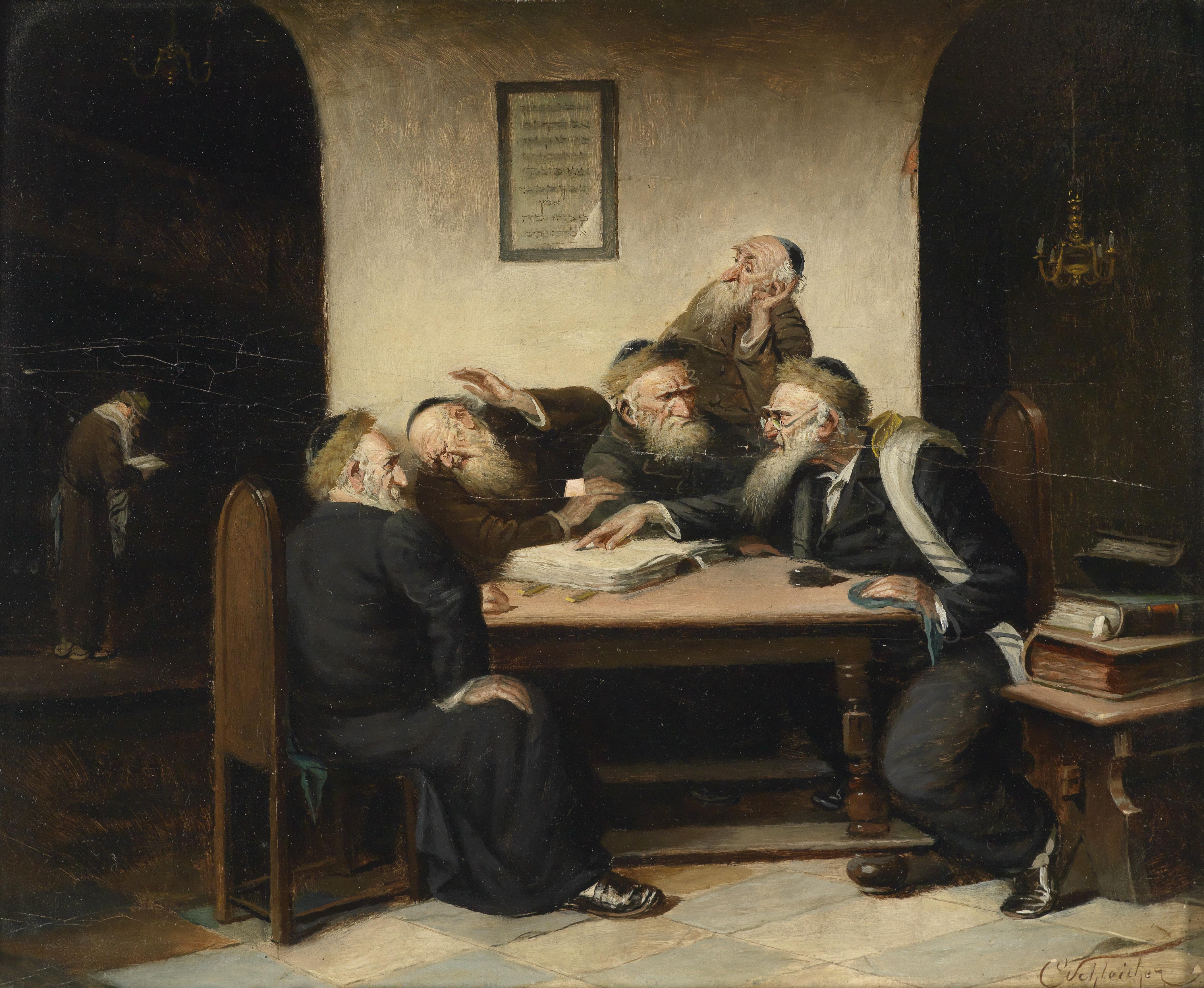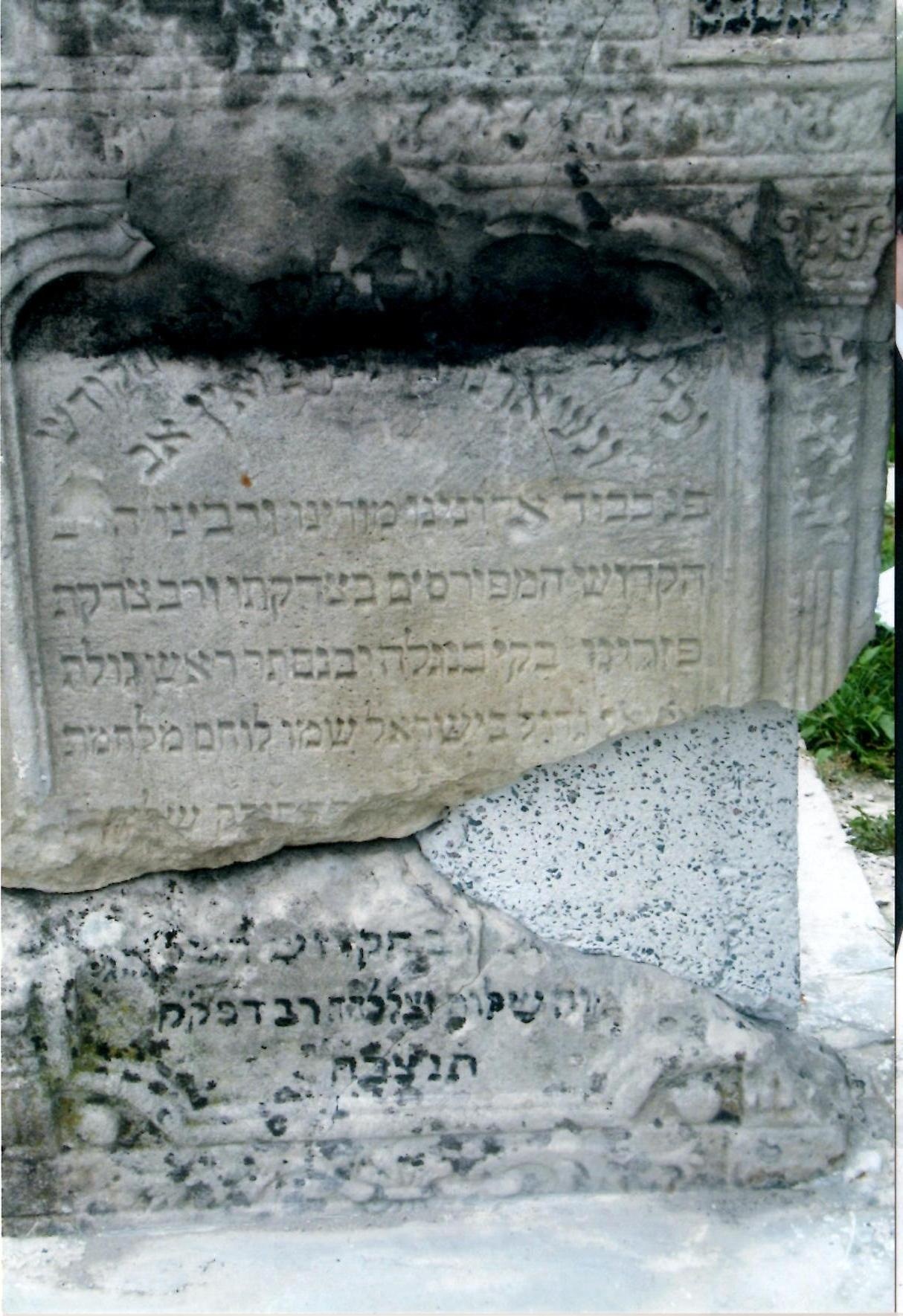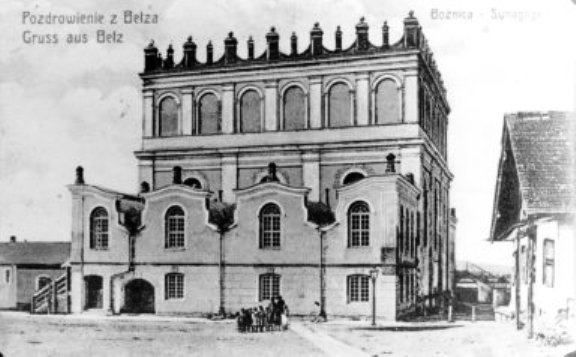|
Moshe Grunwald
Moshe Greenwald (1853–1910), also spelled Grunwald, a rabbi in Hungary at the end of the 19th century. He was the rabbi of Chust, Hungary and progenitor of the Pupa Hasidic dynasty through his son Yaakov Yechezkiya. He was also the author of ''Arugas Habosem'', a book of responsa covering halakhic issues. Biography He was the eldest son of Amram Greenwald He studied at the yeshiva of Menachem Katz, a disciple of Hatam Sofer, in Deutschkreutz, now in Austria, with his grandfather Yosef Greenwald, and at the Pressburg Yeshiva under the Ketav Sofer His father died when he was twenty and he worked in timber trading, while continuing his studies. At that time, he married his relative Zissel Gestetner. At the age of twenty-six he began working as a rabbi in the city of Humenné in Hungary (today in Slovakia). In 1887, he became rabbi of the city of Kisvárda in Hungary. Greenwald was originally from a non-hasidic family but as a young man he became a hasid and travele ... [...More Info...] [...Related Items...] OR: [Wikipedia] [Google] [Baidu] |
Kisvárda
Kisvárda (; german: Kleinwardein, yi, קליינווארדיין, Kleynvardeyn) is a town in Szabolcs-Szatmár-Bereg County, in the Northern Great Plain region of eastern Hungary near the border of Slovakia and Ukraine. It is the 3rd largest town in Szabolcs-Szatmár-Bereg after Nyíregyháza and Mátészalka with a population of 16 669 people. The Subregion of Kisvárda lies between two large landscapes, the Nyírség and the Rétköz. Kisvárda is just from the border of Ukraine, from Slovakia, from Nyíregyháza, from Ungvár (Uzhorod), from Beregszász (Berehove), from Sátoraljaújhely and from Dorolţ, Romania. Etymology The name of the town, which means "little castle" in Hungarian, dates back to the Conquest of Hungary. The conquering Hungarians named the town for its earthwork. In the Middle Ages, it occurred like ''Warda'' and ''Warada'' in documents. The "kis" (meaning ''little'') word part was added to differentiate the town from Nagyvárad (now Oradea, Roma ... [...More Info...] [...Related Items...] OR: [Wikipedia] [Google] [Baidu] |
Gemara
The Gemara (also transliterated Gemarah, or in Yiddish Gemo(r)re; from Aramaic , from the Semitic root ג-מ-ר ''gamar'', to finish or complete) is the component of the Talmud comprising rabbinical analysis of and commentary on the Mishnah written in 63 books. At first, Gemara was only transmitted orally and was forbidden to be written down, however after the Mishnah was published by Judah the Prince (c. 200 CE), the work was studied exhaustively by generation after generation of rabbis in Babylonia and the Land of Israel. Their discussions were written down in a series of books that became the Gemara, which when combined with the Mishnah constituted the Talmud. There are two versions of the Gemara. The Jerusalem Talmud (Talmud Yerushalmi), also known as the Palestinian Talmud, was compiled by Jewish scholars of the Land of Israel, primarily of the academies of Tiberias and Caesarea, and was published between about 350–400 CE. The Talmud Bavli (Babylonian Talmud) was pu ... [...More Info...] [...Related Items...] OR: [Wikipedia] [Google] [Baidu] |
Torah Study
Torah study is the study of the Torah, Hebrew Bible, Talmud, responsa, rabbinic literature, and similar works, all of which are Judaism's Sifrei kodesh, religious texts. According to Rabbinic Judaism, the study is done for the purpose of the ''mitzvah'' ("commandment") of Torah study itself. This practice is present to an extent in all religious branches of Judaism, and is considered of paramount importance among religious Jews. Torah study has evolved over the generations, as lifestyles changed and also as new texts were written. Traditional view In rabbinic literature, a heavy emphasis is placed on Torah study for Jews, Jewish males, with women being exempt. This literature teaches an eagerness for such study and a thirst for knowledge that expands beyond the text of the Tanakh to the entire Oral Torah. Some examples of traditional religious teachings: * The study of Torah is "equal to all" of the ''Mitzvah, mitzvot'' of Honour thy father and thy mother, honouring one's pare ... [...More Info...] [...Related Items...] OR: [Wikipedia] [Google] [Baidu] |
Pilpul
''Pilpul'' ( he, פלפול, loosely meaning 'sharp analysis'; ) is a method of studying the Talmud through intense textual analysis in attempts to either explain conceptual differences between various halakhic rulings or to reconcile any apparent contradictions presented from various readings of different texts. The word ''pilpul'' has entered English as a colloquialism used by some to indicate extreme disputation or casuistic hairsplitting. Sources The requirement for close derivation of the conceptual structures underlying various Jewish laws, as a regular part of one's Torah study, is described by Maimonides as follows: Other such sources include ''Pirkei Avot'', the Babylonian Talmud, Rashi, and Shneur Zalman of Liadi. Narrow definition In the narrower sense, ''pilpul'' refers to a method of conceptual extrapolation from texts in efforts to reconcile various texts or to explain fundamental differences of approach between various earlier authorities, which became popular ... [...More Info...] [...Related Items...] OR: [Wikipedia] [Google] [Baidu] |
Reform Judaism
Reform Judaism, also known as Liberal Judaism or Progressive Judaism, is a major Jewish denomination that emphasizes the evolving nature of Judaism, the superiority of its ethical aspects to its ceremonial ones, and belief in a continuous search for truth and knowledge, which is closely intertwined with human reason and not limited to the theophany at Mount Sinai. A highly liberal strand of Judaism, it is characterized by lessened stress on ritual and personal observance, regarding ''halakha ''Halakha'' (; he, הֲלָכָה, ), also transliterated as ''halacha'', ''halakhah'', and ''halocho'' ( ), is the collective body of Jewish religious laws which is derived from the written and Oral Torah. Halakha is based on biblical commandm ...'' (Jewish law) as non-binding and the individual Jew as autonomous, and great openness to external influences and progressive values. The origins of Reform Judaism lie in German Confederation, 19th-century Germany, where Rabbi Abraham Geige ... [...More Info...] [...Related Items...] OR: [Wikipedia] [Google] [Baidu] |
Yoel Zvi Rata , a community in the United States
{{disambiguation, hn, geo ...
Joel or Yoel is a name meaning "Yahweh Is God" and may refer to: * Joel (given name), origin of the name including a list of people with the first name. * Joel (surname), a surname * Joel (footballer, born 1904), Joel de Oliveira Monteiro, Brazilian football goalkeeper * Joel (footballer, born 1980), Joel Bertoti Padilha, Brazilian football centre-back * Joel (prophet), a prophet of ancient Israel ** Book of Joel, a book in the Jewish Tanakh, and in the Christian Bible, ascribed to the prophet * Joel, Georgia, a community in the United States * Joel, Wisconsin The Town of Clayton is located in Polk County, Wisconsin, Polk County, Wisconsin, United States. The population was 571 at the 2000 census. The Clayton (village), Wisconsin, Village of Clayton and the unincorporated communities of Joel and Richard ... [...More Info...] [...Related Items...] OR: [Wikipedia] [Google] [Baidu] |
Beth Din
A beit din ( he, בית דין, Bet Din, house of judgment, , Ashkenazic: ''beis din'', plural: batei din) is a rabbinical court of Judaism. In ancient times, it was the building block of the legal system in the Biblical Land of Israel. Today, it is invested with legal powers in a number of religious matters (''din Torah'', "matter of litigation", plural ''dinei Torah'') both in Israel and in Jewish communities in the Diaspora, where its judgments hold varying degrees of authority (depending upon the jurisdiction and subject matter) in matters specifically related to Jewish religious life. History Rabbinical commentators point out that the first suggestion in the Torah that the ruler divest his legal powers and delegate his power of judgment to lower courts was made by Jethro to Moses (Exodus ). This situation was formalised later when God gave the explicit command to "establish judges and officers in your gates" ( Deuteronomy ). There were three types of courts (Mishnah, trac ... [...More Info...] [...Related Items...] OR: [Wikipedia] [Google] [Baidu] |
Hamodia
''Hamodia'' ( he, המודיע – "''the Informer''") is a Hebrew-language daily newspaper published in Jerusalem. A daily English-language edition is also published in the United States, and weekly English-language editions in England and Israel. A weekly edition for French-speaking readers debuted in 2008. The newspaper's slogan is "The Newspaper of Torah Jewry". It comes with two magazines, ''Inyan'' and ''Prime''. ''Haaretz'', the newspaper of Israel's secular left, describes ''Hamodia'' as one of the "most powerful" newspapers in the Haredi community. History ''Hamodia'' was founded in 1950 by Rabbi Yehuda Leib Levin, son of the Agudat Israel leader Rabbi Yitzhak-Meir Levin of Warsaw and Jerusalem. Its current director general is Rabbi Chaim Moshe Knopf, and its deputy director general is Knopf's son, Rabbi Elazar Knopf. English-language edition The English-language edition of ''Hamodia'' is published by Levin's daughter, Ruth Lichtenstein. It was first printed on February ... [...More Info...] [...Related Items...] OR: [Wikipedia] [Google] [Baidu] |
Yehoshua Rokeach
Rabbi Yehoshua Rokeach (1825 – February 3, 1894), known as the ''Mitteler Ruv'', was the second Rebbe of the Belz Hasidic dynasty. He combined Torah scholarship with practical common sense to guide thousands of Hasidim and to fight the Haskalah ("Enlightenment") movement that was making inroads in Jewish communities in Poland during the nineteenth century. His pioneering activities included founding the Machzikei Hadas organization. Family Rabbi Yehoshua Rokeach was the youngest of five sons of Rabbi Sholom Rokeach (the ''Sar Shalom''), founder of the Belz dynasty. His eldest brother was named Elazar.Padwa, Rabbi Akiva Osher. "Rabbi Yehoshua Rokeach, the 'Mittler' Belzer Rav, ''zt"l'', in honor of his 118th ''yahrtzeit'', 23 Shevat". ''Hamodia'' Magazine, February 16, 2012, pp. 5-6. His father was his primary teacher. Yehoshua married a granddaughter of the Apter Rov and had five sons and four daughters. Leadership The notion of a son succeeding a father as Rebbe was un ... [...More Info...] [...Related Items...] OR: [Wikipedia] [Google] [Baidu] |
Siget (Hasidic Dynasty)
Siget or Ujhel-Siget or Sighet Hasidism, or Sigter Hasidim, is a movement of Hungarian Haredi Jews who adhere to Hasidism, and who are referred to as ''Sigeter Hasidim''. Sighet Hasidism originated in the town of Máramarossziget, Hungary ( yi, סיגעט, now Sighetu Marmației, Romania). Siget is the parent dynasty of the more famous Satmar Hasidic dynasty. Since 1980, the leadership of Siget and Satmar have been united in the person of the Admor of Satmar, though the two groups continue to operate separate synagogues and retain differences in certain customs. Founding Hasidism was brought to Hungary by Rabbi Moshe Teitelbaum of Ujhel (known as the "''Yismach Moshe''"), a disciple of the "Chozeh of Lublin", Rabbi Yaakov Yitzchak of Lublin. The Sighet Hasidic dynasty began with Rabbi Yekusiel Yehuda Teitelbaum (I) (1808–1883), his grandson. The town of Sighet was in need of a rabbi to lead the Beis Din and answer the Jewish towns-people's religious questions. Teitelbaum app ... [...More Info...] [...Related Items...] OR: [Wikipedia] [Google] [Baidu] |
Belz (Hasidic Dynasty)
Belz ( yi, בעלזא) is a Hasidic dynasty founded in the town of Belz in Western Ukraine, near the Polish border, historically the Crown of the Kingdom of Poland. The group was founded in the early 19th century by Rabbi Shalom Rokeach, also known as the ''Sar Shalom'', and led by his son, Rabbi Yehoshua Rokeach, and grandson, Rabbi Yissachar Dov, and great-grandson, Rabbi Aharon, before the Nazi invasion of Poland in 1939. While Rabbi Aharon managed to escape Europe, together with his brother Rabbi Mordechai Rokeach, most of the Belz Hasidim were murdered in the Holocaust. Rabbi Aharon re-established the Hasidic community in Israel following World War II. At present Belz has sizable communities in Israel, Western Europe, and the Anglosphere. History The founder of the dynasty was Rabbi Shalom Rokeach, also known as the ''Sar Shalom'', who was inducted as rabbi of Belz in 1817. He personally helped build the city's large and imposing synagogue. Dedicated in 1843, the buildin ... [...More Info...] [...Related Items...] OR: [Wikipedia] [Google] [Baidu] |

.jpg)





